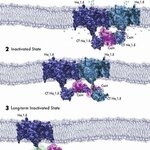
Heart attacks are often caused by conditions that affect electrical signaling in the heart. Genetic studies have linked two of these conditions, long QT syndrome and Brugada syndrome, to mutations in the sodium channels that let sodium ions into cells in response to electrical signals. A multidisciplinary team has been tracking the complex of proteins thought to be at fault in some cases of sudden cardiac death and now they have finally captured images of the complex. Those images reveal the connection between some genetic mutations and electrical abnormalities of the heart and provide…



